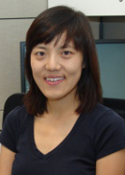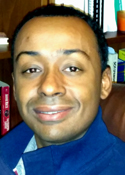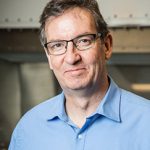 Jooyeon Hwang
Jooyeon Hwang
Describe your job-what do you do, what is a typical day like?
On most days, I start by prioritizing what should be done first. For instance, on a typical day last week, I prepared for a project meeting. My task was to provide supporting data and a recommendation that would help the project. After the meeting, I attended a seminar that is directly related to my ongoing research.
What do you like about your job? What do you like least about your job?
A rich research environment is my favorite type of environment. My research skills are enhanced by working with a highly collaborative and multidisciplinary team including researchers from epidemiologists to clinical physicians. Many of them come from across the U.S. and around the world. My scientific and personal experiences have been broadened and deepened by interacting with them. Because we often deal with state-of- the-art projects here, the research for each project takes a long time. However, once I find the issue or at least get closer to the answer, I am so proud that my work is a small fraction that contributes to discovering the occupational and environmental determinants of cancer.
What got you interested in this field?
I naturally got into IH (industrial hygiene) because of my research interests. As I worked on my project in Korea, where I am originally from, I observed many workers who had been directly exposed to toxic gases from livestock as well as workers who were suffering from respiratory diseases. I became more interested in studying the effects of these toxins on people rather than on livestock. I decided that I wanted to help workers understand the effects of the environment on their health. As I have delved deeper into occupational and environmental exposure assessment, I have gained a deeper appreciation for the strong interactions of occupational/environmental issues, statistical modeling, and epidemiological research.
Where do you see yourself going in the future?
I am driven to be the best at my research. I will continuously pursue opportunities to develop my analytical and technical skills for projects, to find challenging answers working with a team, and to contribute the findings to the scientific community. Many innovative investigators at previous and current jobs have made me confident that I can keep developing my skills well into the future.
What did you gain from your University of Minnesota educational experience?
My experiences at the University of Minnesota were immeasurable, from classes to field research. My professors were instrumental in my academic and personal growth. They challenged me to perform my best with their support and encouragement. The School of Public Health field experience as well as my doctoral research field experience opened my eyes through my communication with the project participants. As a result, I undoubtedly gained the in-depth expertise, not only from textbooks but also from activities outside of class, necessary to achieve my life goals at the University of Minnesota.
What advice would you give someone just starting out in this field?
What I did when I had just started in this field was to try to find out things myself. One good way to do this might be by engaging classmates in IH by attending activities, seminars, and meetings. The experienced classmates also can give you practical advice as peers. Keep asking yourself intellectually inquisitive and passionate questions about the field. Then you will find yourself in love with IH.

 Perry Logan
Perry Logan Andre Reed
Andre Reed


